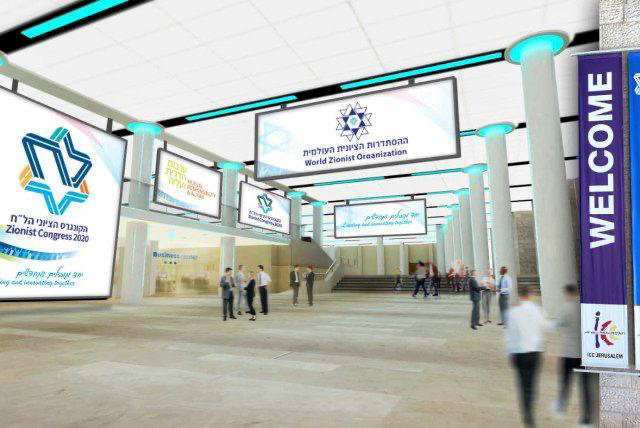World Zionist Congress bridges partisan divide
The 38th World Zionist Congress (WZC) concluded with the largest American delegation ever as Jews representing a wide range of religious and political orientations gathered virtually to discuss issues related to Israel and Zionism.
More than 700 delegates and thousands of people from 35 countries attended.
“A lot more people were able to participate because of the virtual platform” necessitated by the pandemic, said American Zionist Movement spokesman Herbert Block. “However, opportunities for direct interaction was limited because of all the people and the time zones. You missed the in-person relationship building.”
More than 123,000 American Jews from all 50 states voted in the Zionist elections that concluded in March — more than double the number that participated in the previous vote, in 2015. In all, 15 slates comprised of nearly 1,800 candidates vied for 152 American seats in the congress, with the number of delegates per slate apportioned using a formula devised by the American Zionist Movement. The votes represented the highest number cast since open Zionist elections were adopted in the American Jewish community 30 years ago.
The high rate of participation may be a sign of the growing importance with which American Jews view the World Zionist Congress, which determines the leadership of the World Zionist Organization, the Jewish Agency for Israel, the Jewish National Fund-Keren Kayemet LeIsrael and Keren Hayesod. Together, these four institutions allocate roughly $1 billion annually.
The US representatives came from more than 30 different organizations and included a majority of delegates from groups on the right, both religiously and politically, including the nascent haredi Orthodox Eretz Hakodesh group. When coupled with the number of religious Zionist members of the Knesset, for the first time the nationalist and religious bloc garnered a majority of seats in the WZC.
Indeed, going into the congress, the ZOA Coalition called the election a “change,” and “that decades of left-wing domination had taken the World Zionist Organization away from its Zionist mandate of protecting and defending the Jewish homeland and people.”
This caused concern among liberal groups that feared Orthodox and right-wing Zionist groups would wrest control of funding and policy priorities for major Zionist agencies, including the Jewish Agency for Israel, Jewish National Fund and United Israel Appeal, to the exclusion of others. Prior to the congress, several groups had suggested that they would break away if there were limits on diversity and pluralism.
This led to an unprecedented move by Hadassah, which is among several centrist Zionist organizations — Hadassah, B’nai B’rith International, Maccabi World Union, WIZO and NAAMAT/USA — that remain neutral to denounce a proposed WZO Agreement of Principles — advanced by the ZOA Coaltion — as “antithetical” to Hadassah’s values.
The deal “must be redrafted in favor of a wide, balanced agreement that includes all Zionist movements, one that represents world Jewry both in Israel and the Diaspora,” wrote Hadassah National president Rhoda Smolow.
Israel’s President Reuven Rivlin alluded to the disagreement in his opening remarks when he noted the importance of working together on common goals: promoting Jewish and Zionist education, fighting anti-Semitism and helping every Jew who wants to move to Israel to make aliyah.
“We have one common destiny, and if we continue to believe in our commonality of Jews, there’s no challenge we can’t get through and get stronger,” he said.
During the three-day conference, attendees hashed out a compromise on how the leadership of the various agencies, including the WZO itself, would be allocated, ensuring that the pluralistic nature of the Jewish community is represented in the various agencies.
“Hadassah applauds the compromise that was reached today that will help ensure that the values of the entire Zionist community are accurately represented,” Smolow said. “Inclusivity, proper representation and unity are principles that Hadassah cherishes and advocates for, and we are proud to support the revised Agreement of Principles for the World Zionist Congress.”
ZOA national president Morton Klein also praised the compromise and the success of the right-wing slates at this year’s Congress.
“The ZOA congratulates new WZO chair Yaakov Hagoel and praises the ZOA Coalition delegates, alternates, and every member of the ZOA Coalition slate for their dedicated hard work and involvement that were vital to the groundbreaking center-right, pro-Israel victories made at the World Zionist Congress,” he said.
Also applauding the results was Rabbi Ari Rockoff, incoming executive vice president of the Religious Zionists of America [Mizrachi].
“Serving as a unifier and building bridges with the broader Jewish community has been a core value that has defined the Mizrachi movement since its inception. And this year at the WZC was no different,” he said.
The left-wing Hatikvah slate, which includes organizations such as J Street, the National Council of Jewish Women, the New Israel Fund and Americans for Peace Now, praised the passage of several resolutions despite “fierce opposition” from right-wing groups. Among those resolutions was one that “assures mutual respect for the diversity of voices within the Zionist Movement that calls for the suspension or dismissal from the WZO and local Zionist organization for personal attacks against the leaders of other Zionist organizations.”
Plans are in the works for an in-person gathering in the fall of 2021 or 2022 that will allow people to meet and continue the work that began during the virtual conference.






